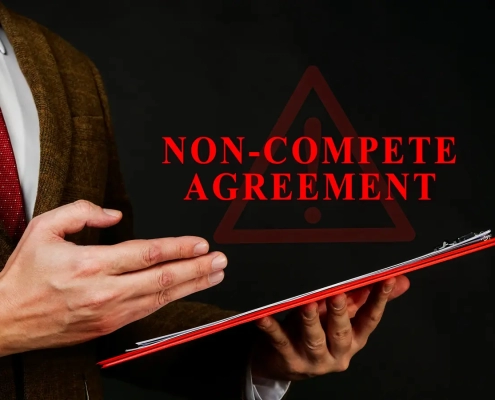Colorado Eviscerates Noncompete Trade Secret Agreements
 Colorado Eviscerates Non-Competition & Trade Secret Agreements Non-competition agreements have arguably been overused to the benefit of employers. HB22-1317 drastically changed Colorado’s law governing these agreements. The changes went into effect on August 9, 2022 and apply to agreements entered into or renewed after August 9, 2022. These changes affect Colorado employers and any business that employs a person who primarily lives or works in Colorado. Being an independent contractor does not avoid the new law.
Colorado Eviscerates Non-Competition & Trade Secret Agreements Non-competition agreements have arguably been overused to the benefit of employers. HB22-1317 drastically changed Colorado’s law governing these agreements. The changes went into effect on August 9, 2022 and apply to agreements entered into or renewed after August 9, 2022. These changes affect Colorado employers and any business that employs a person who primarily lives or works in Colorado. Being an independent contractor does not avoid the new law.
First a very simplified, broad overview of the previous law. The previous law prohibited agreements not to compete and provided exceptions for non-competition obligations to protect trade secrets, and agreements with executive and management personnel, officers, and employees who constitute professional staff to executive and management. In our experience, this exception for management was liberally construed by the courts. Practically anybody could be considered “management” and be subject to a non-competition agreement. Agreements not to solicit customers were treated like non- competition agreements. The previous law did not impose any limitations on confidentiality agreements protecting trade secrets and business information that might not be considered a trade secret.
Practically speaking, HB22-1317 probably eliminates the employer’s ability to obtain a non-competition agreement from most of its employees even if the goal is to protect trade secrets. If the employee’s annualized cash compensation is more than $101,250, an employer may enforce a covenant to protect trade secrets if the covenant is no broader than reasonably necessary. This amount is recalculated annually based upon Colorado’s threshold pay for highly compensated workers.
An agreement not to solicit customers is valid provided that the restriction it is no broader than necessary to protect the employer’s legitimate interests in its trade secrets. However, the employee’s annualized cash compensation must be at least $60,750 in 2022. Again, this amount is recalculated each year.
Under the previous law, parties to non-compete and trade secret agreements could choose which state’s law applied so long as the choice of law was reasonable. For example, if the company’s
headquarters was in Minnesota and the employee’s territory included states other than Colorado, Minnesota law could be chosen as the applicable law. Not anymore. If a worker primarily lives or works in Colorado, the restrictive covenant must be governed by Colorado law and can only be enforced in Colorado if a party so chooses. At least according to Colorado. I guarantee we will see challenges toColorado’s long arm jurisdiction.
The use of force, threats, or other means of intimidation to limit a person from pursuing a lawful occupation is a Class 2 misdemeanor and has been in Colorado since 2021. An employer who tenders avoid non-competition agreement as condition of employment, or who enters into a void non-competition agreement, or makes any effort to enforce a void non-competition agreement can be liable for financial penalties and damages.
A final caveat. We always publish a disclaimer with these articles. This is especially true with HB22-1317. HB22-1317 completely changes existing Colorado law governing agreements not to compete and trade secrets. We have greatly simplified the changes, left out many exceptions, and left out many details. If you are a party an employment agreement, do not act on anything in this article. Seek out legal counsel for a proper opinion on your particular agreement. If you are an employer, we strongly suggest you have your legal counsel review your current agreements and procedures. Failure to follow this law can result in criminal penalties, civil penalties, and render the agreement void.
Colorado Eviscerates Noncompete Trade Secret Agreements

